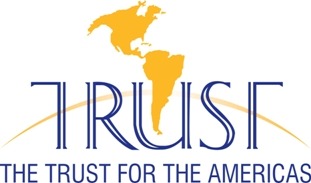 On September 29 at the Global Washington office, The Trust for the Americas hosted a discussion with Seattle-area companies and nonprofits with the goal of getting feedback and generating new ideas from a diverse group of leaders. Represented at the meeting were PwC, Tableau, Morgan Stanley, Mass Mutual, Waldron, Catalyst Innovators Group, Benaroya Company, World Vision, UW Bothell and New Majority Consulting.
On September 29 at the Global Washington office, The Trust for the Americas hosted a discussion with Seattle-area companies and nonprofits with the goal of getting feedback and generating new ideas from a diverse group of leaders. Represented at the meeting were PwC, Tableau, Morgan Stanley, Mass Mutual, Waldron, Catalyst Innovators Group, Benaroya Company, World Vision, UW Bothell and New Majority Consulting.
The Trust for the Americas’ Chief Executive Officer, Linda Eddleman, and Director of Programs, Maria Liliana Mor, led the conversation. A Washington, D.C.-based organization, The Trust for the Americas has programs in 19 different countries stretching across central and southern America. Their programs primarily focus on providing technology and education to youth with physical disabilities. Their newest project is an extension of their Partnership in Opportunities for Employment through Technologies in the Americas program (POETA), and is being launched in Mexico, Jamaica and Colombia where The Trust and Microsoft have continued their long-standing partnership to create technology hubs. These hubs were modeled after technology centers at MIT and designed for physically disabled youth to have a space to push their technological understanding further and produce new inventions.
After recently launching this extension of POETA, Eddleman and Mor wanted to get perspectives from Pacific Northwest organizations. A few major themes arose during the meeting: Youth empowerment and sense of belonging, program incubators for youth to learn business strategies, and planned connections to support young inventors in becoming successful entrepreneurs.
Representatives from UW Bothell and World Vision talked about the importance of not just stressing youth self-esteem, but also a sense of belonging. Recent studies from UW show that a sense of belonging is actually what spurs self-esteem in children.
In addition to embedding a sense of belonging within The Trust programs, meeting attendees stressed the importance of young students being inspired to go beyond their preconceived career expectations. Those at the meeting who were born in Latin America explained that often in their culture, and even more so for youth with disabilities, children follow in a path decided by their families and are not often encouraged to push past these goals. The Trust wants to inspire marginalized youth to see themselves as innovative entrepreneurs and then provide them with the tools to succeed.
Morgan Stanley, Catalyst Innovators Group and Tableau representatives tossed around the idea of an incubator for the young entrepreneurs. Because of the difficulties starting a business in Central or South America, attendees stressed the importance of giving youth in the POETA programs a multitude of resources and means of support to help start and grow their ideas. Lastly, Waldron commented on the importance of rhetoric. Instead of referring to the youth as merely students, they could also be called “inventors.”
The Trust for the Americas staff were appreciate of the feedback and thought generation. Because of the prevalence of innovative technology here in the Pacific Northwest, Eddleman believes the group discussion was much different than her discussions elsewhere in the country, and enjoyed hearing the diversity of ideas that the meeting brought about.